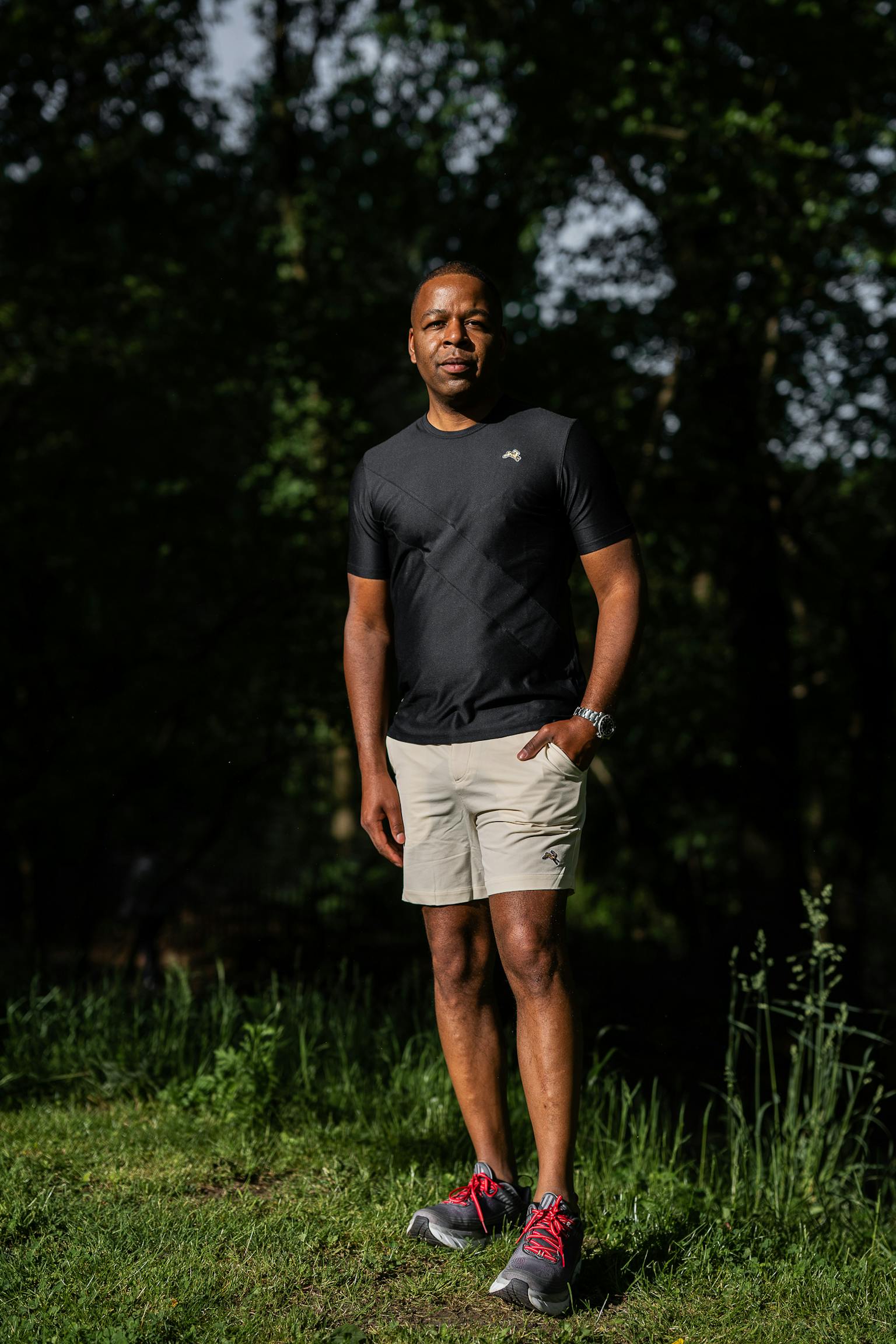
Charles Moore:
Why Black People
Don't Run Marathons
Interview by Sheridan Wilbur
Photography by Johnny Zhang
In 2016, as Charles Moore approached the start line of the New York City Marathon on the Verrazano Bridge, he looked around at the sea of eager faces. There were very few black ones. That day, Moore raced his first marathon, a feat that sparked an obsession: he went on to complete 18 more over the next three years. Moore’s memoir, Black People Don't Run Marathons, which is being produced with the assistance of the Tracksmith Fellowship Program, will chronicle his experience embracing distance running at age forty and all that he’s learned about himself and running culture.
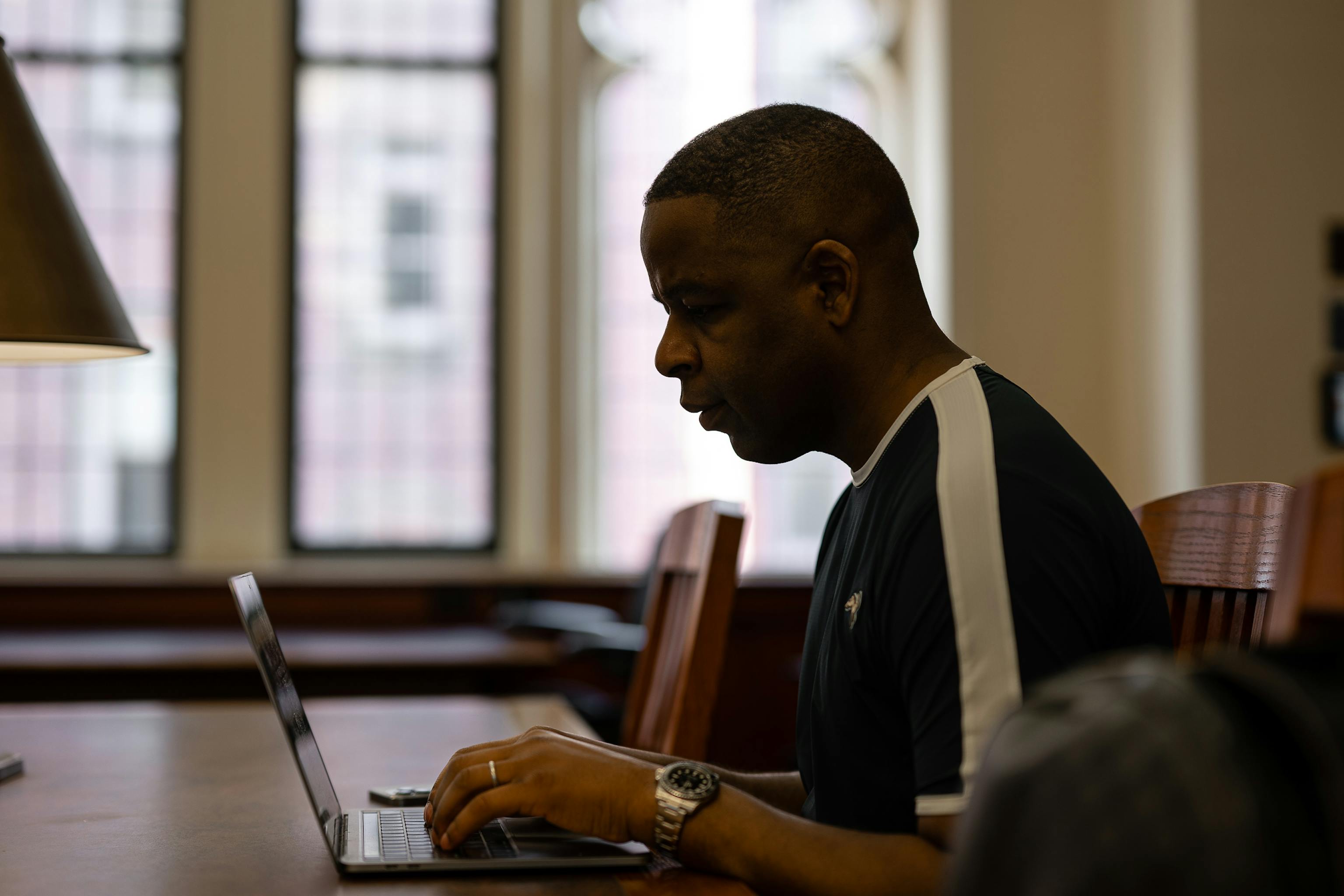
I'd love to hear the origin story of how you began writing. How did you start?
Charles Moore: I always wanted to write. I tried writing in the past and never really followed through. Then there came a moment where I was trying to decide what I wanted to do in the art world. I was in a career change from banking into art – initially I was going to start a hedge fund that would invest in art. I thought, “No, that's just the same thing I'm doing now. It's just a different product.” Then I pitched an article to a major online publication for art. They accepted it. It was pretty bad but the editorial team really wanted to support me. They were willing to dig in and edit the piece and help guide me. I had no clue what I was doing and I liked it.
So I started writing more for other online publications and different types of articles; exhibition reviews to artist profiles, to opinion pieces and things about the economics of art and art collecting. Then the pandemic hit. I was trying to figure out what I was going to do before I started my doctoral program. I decided I was going to write a book about art collecting. I wrote this book called The Black Market, a Guide to Art Collecting. I would say it's like a blueprint that guides you through the whole industry and what it means to be a collector.
You've written extensively about the art market. Are there any people specifically, or other authors and experiences that inspire your work now?
Charles Moore: Not necessarily in my field, but I like what I'm reading right now White by Brett Easton Ellis. I really like his writing. American Psycho is a very controversial book, but the writing is incredible – the way he writes, it’s very similar to White. I just read David Goggins memoir, Can't Hurt Me. There's a lot of bros that are really obsessed with him. But he is just a regular dude that is so driven; setting and accomplishing personal goals. It was really inspiring to me.
I said to my best friend, I was hoping after Tracksmith gave me the fellowship, I'd get motivated to start writing. That didn't work. I was waiting for the official announcement and that didn't work. Then I was like, all right, I'm going to start training for the marathon. That didn't work. Then I started reading his memoir and just started like, going hard writing. I'm in like around 15,000 words. It's been great to get that spark and start.
I would say for anyone who wants to write long form, book novel nonfiction; you just have to find what really motivates you and inspires you. You have to seek it out and stay around positive people who are doing interesting and incredible things. That was the reason why I ran so many marathons. It is weird because I know there's people who run more marathons than me in shorter periods. That's great and it's not to take anything away from them, but my story is interesting because I never intended on running a marathon. Just a year prior, I wouldn't even run a 5k.
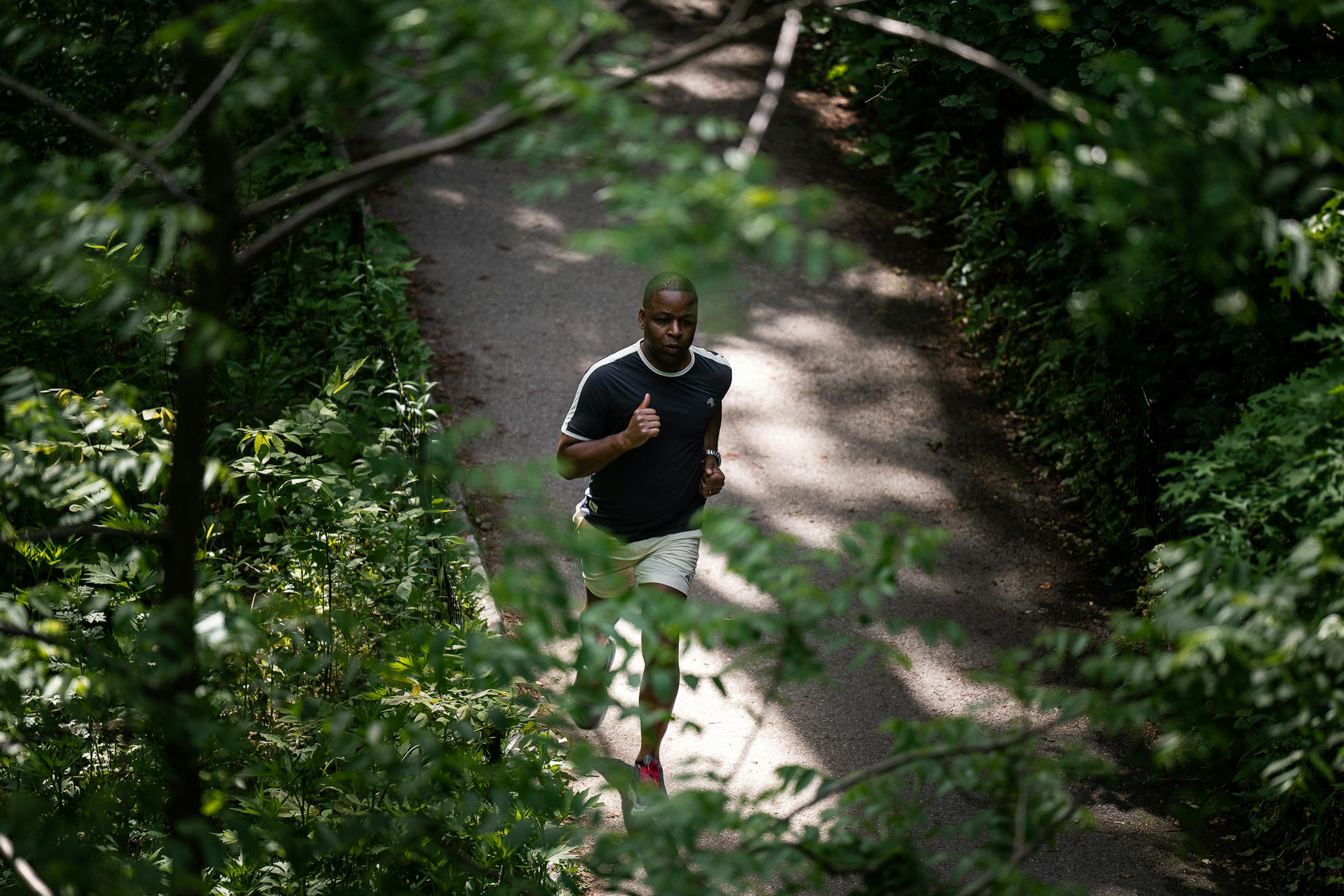
Could you share how you started running?
Charles Moore: I'm a pretty healthy person. I rarely get sick. When I get colds, they're very short lived. But I'm a big baby and I'll just lay in bed to get it over with. So in 2015, I laid in bed for two days. By Sunday, I had to get out of the house. I had to get out of this bed. I randomly went for a walk. I lived on 35th and Fifth Avenue in New York City. Oddly, it was never a path I'd ever taken. I walked up towards Columbus Circle, not knowing it’s Marathon Sunday in New York City.
Marathon's were not on my radar, not on my calendar. I was never a spectator. I got to the finish line and saw all these people finishing the marathon. I was like, "What is this? Oh, it's the New York City Marathon.” By this time, I'm at the point where I'm seeing the people who cross the finish line. They're excited. I saw something on their face that I had never seen before. The way I describe it is, I saw the face of people who just got the shit kicked out of them, but they still won. So self imposed. They're like, “I just won. I just did that. I just got this medal.” Why did they do that?
I thought to myself, “Wow. I don't think I've ever had that feeling before. I need that feeling.” That day I decided I was running the NYC Marathon. Every time I would tell someone I decided I was going to run the marathon, they were like, “You crazy.” Not because it's impossible, they just knew it wasn't my style. I had never talked about running or aspired to do it. But that moment meant it became my thing.
I trained for a marathon. I ran all these 5Ks and 10Ks during the beginning of 2016 leading up to the marathon. Also, people said I would never run a marathon because I don't like hiking or things like that. I never trained outdoors. I started training in the winter time and ran on a treadmill and when the weather got better, I still continued to train on a treadmill. Instead of normal marathoners who'd run in the elements in which they would be running on race day, I was doing all these 5Ks and 10Ks to get my outdoor experience. Jokingly, I would say, “I only run outside on race day.”
Do you listen to music on your runs?
Charles Moore: I do. If I run on a treadmill, I listen to music because otherwise I'd be bored to death. When I did 5K and 10Ks, I didn't really listen to music, but anything 10 miles and above, I listen to music.
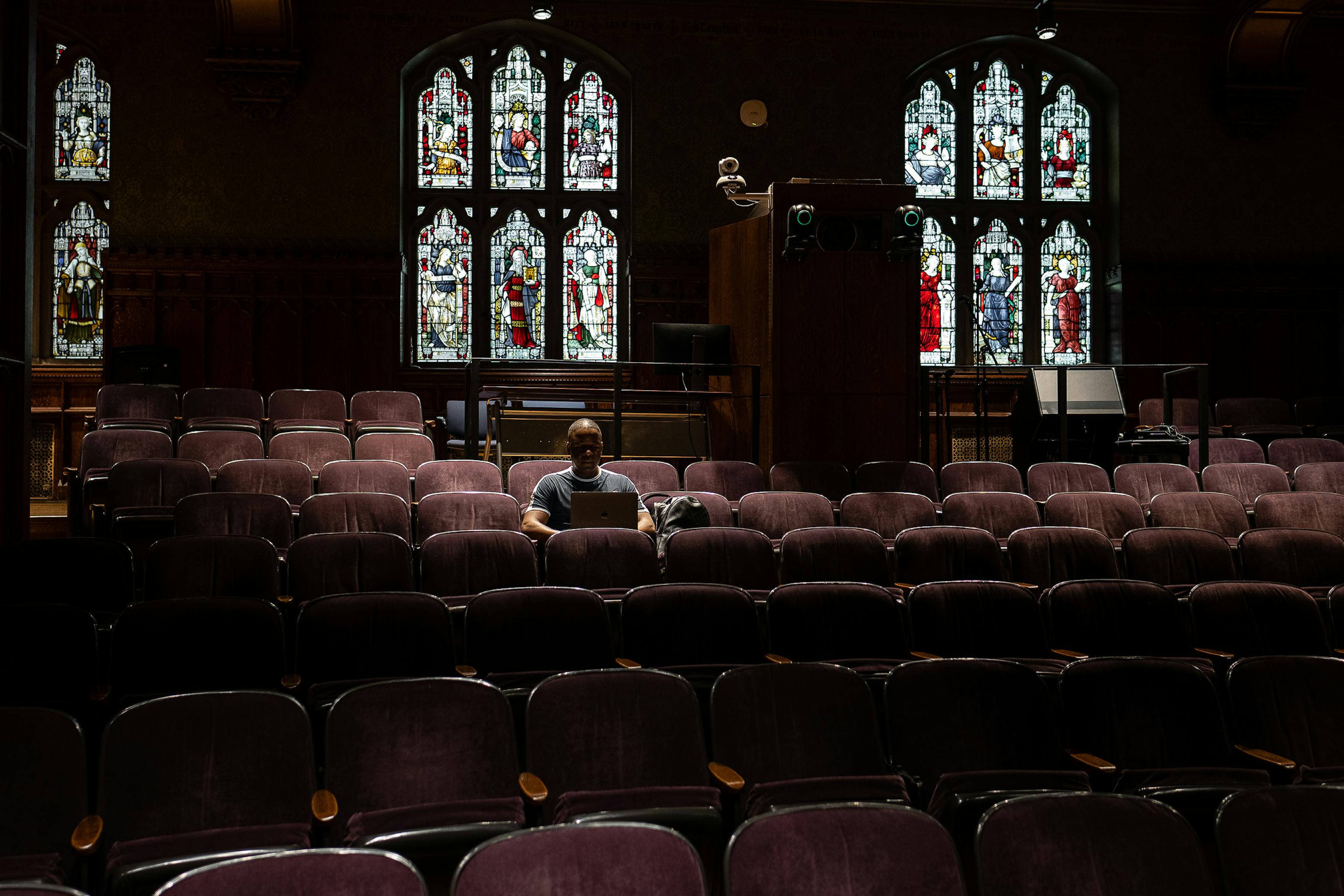
Makes sense. So flash forward to a few years later, being a runner and also being well acquainted into the writing community, how did you dream up this fellowship project?
Charles Moore: I only really stopped running marathons because of the pandemic. I was shooting for doing the six world majors. I completed five of the six. I was supposed to run Tokyo in March 2020, but my final marathon was November 2019 in New York City. Then when I would talk to someone about the good old days when I was running marathons, people would say, you should write a book about that. The first couple times it was like, “Ah, no one would want to read that.” And then, after the fourth or fifth time, I thought maybe people would want to read that.
I thought I would, if the time is right. I don't want to force it. If it feels right then it'll happen. If it doesn't, it won't. The last time I heard this, I was curating an art exhibition with this artist and we were having lunch. He was on the phone with his gallery. He was like, “Yeah, I'm with this guy, Charles Moore who ran 15 marathons.” He didn't say the guy who's going to write the catalog essay for my exhibition, the guy who's going to curate the show. When he got off the phone, I was like, “Why did you lead with that? Not like my art stuff? He was like, “Man, I talk to people who do art things all the time, but I've never met a person who ran 15 marathons. You should write a book about it.”
The funny thing is, the next day I got an email from Tracksmith saying, “Hey, here's applications, our opening for this fellowship opportunity.” It was literally the next day. I immediately applied.
Now you're bringing these two worlds together by writing about running. How does running itself inform your creativity, if it does?
Charles Moore: I think it does because even when there's other people running with you, you have this moment of silence by yourself. Even listening to music, you can be at one with your thoughts. A lot of my great ideas come from when I'm doing something alone. Running is a space to clear your head, open your mind, think about steps that you could take to complete a task and then map out how you do it. I ran two miles today. It was great: 20 minutes of just thinking about what I'm going to say tomorrow at this talk. I think it definitely does help with creativity.
What do you hope people take away from reading your book?
Charles Moore: Find things that inspire you and go after them. Don't listen to what people say you can't do. You can accomplish anything. I was looking on Instagram and watching this runner who appears to be overweight – she even talks about herself as an overweight person. But she's an avid runner. She's running ultras, totally defying the odds of what people think or say that she should do or be. It's totally cliche because people say it all the time, but marathons are a metaphor for life: life is a marathon. You could relate running a marathon to almost any type of goal in life. It’s like anything that requires consistency and commitment; raising a child, being in a relationship, romantic or even a personal friendly relationship. If you're a true friend, the great times are always great, but are you committed and consistent when it's not good for that person?
It’s like you're in a marathon in that relationship.
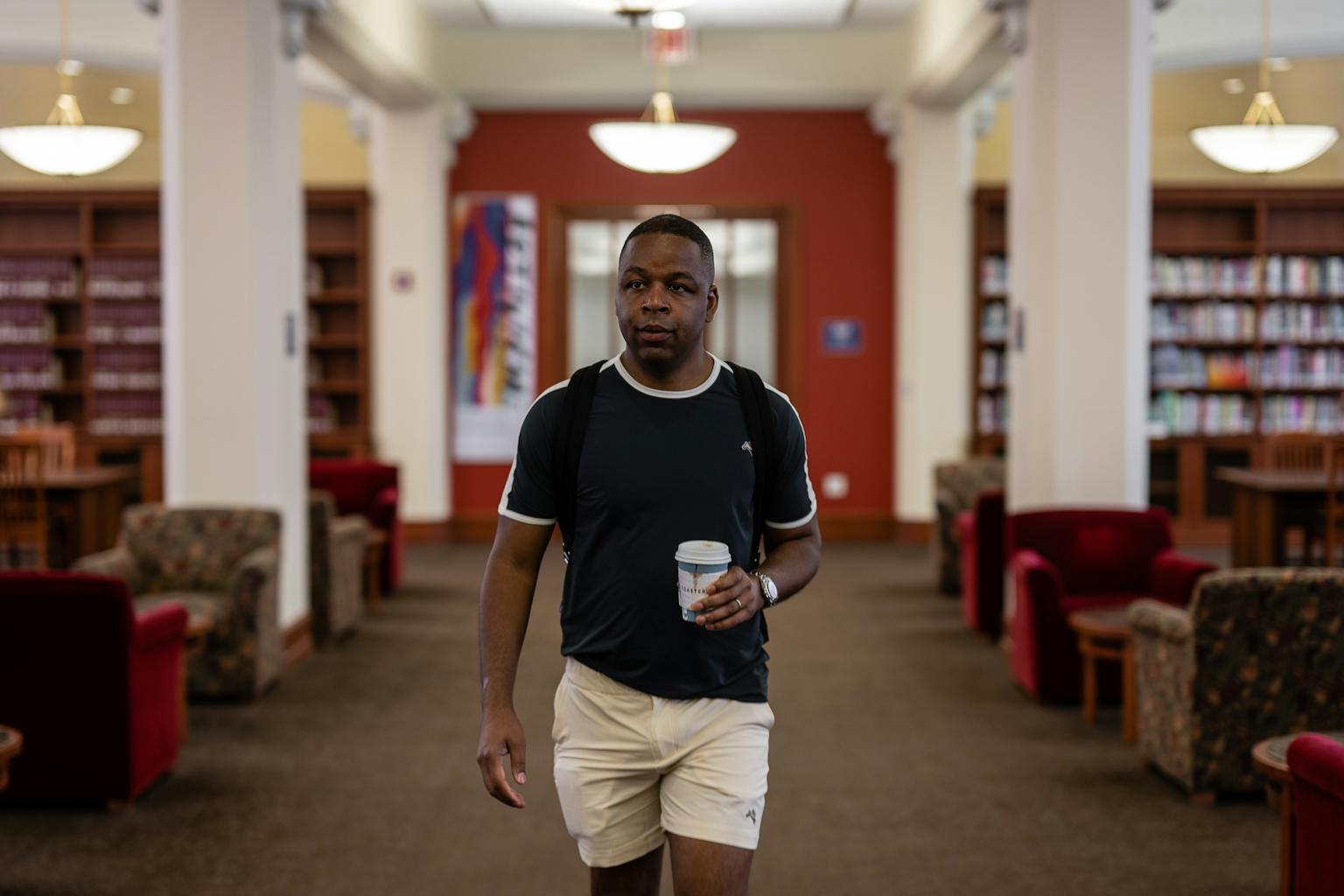
Do you have a routine? How is your schedule to get yourself to be motivated and write on a consistent committed basis?
Charles Moore: When I wrote the first book, I had nothing to do, so I didn't really need a routine. That was an outlier. With this particular project, having a routine keeps me on point. If you don't have a routine, you'll write 1,000 words here, 50 words there, 100 words here and you're like, “What am I doing? When will I finish?” I'm really inconsistent. I actually hired a person to check in with me every week. I felt motivated. I got on a roll. I wanted to keep the momentum up. It's not their regular job but it's someone who's going to keep me accountable because they're not my best friend who says, “You know what? Let's just go up to lunch. We don't need to talk about that… We could talk about my girlfriend and my vacation.” Not to say that we're not friendly, but it’s been really helpful because I'm on track. I'm pretty consistent every week.
Charles Moore's portfolio is here.